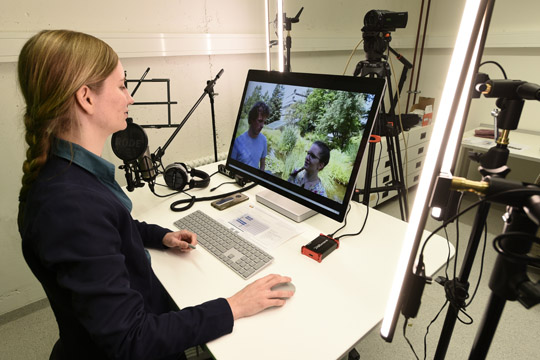Ambassadors Spread the Word
Freiburg, Jul 31, 2020
Flexible educational formats that respond to the varied needs of students, online cross-border studies, ‘ambassadors’ in the faculties and a ‘house of teaching and learning’ that combines every resource and competence under one roof: these are the goals set by the Albert Ludwig University in its recently-published Strategy for digitization in teaching. Preliminary work on the document started long before the corona pandemic, and it has proved itself during the crisis: the University of Freiburg has taken the right decisions to cope with developments over the next few years.
 Lights, camera, action: teachers use the ministudio at the Faculty of Biology to enrich their teaching with digital elements. Photo: Thomas Kunz
Lights, camera, action: teachers use the ministudio at the Faculty of Biology to enrich their teaching with digital elements. Photo: Thomas Kunz
The virus struck, and chaos overwhelmed the campus: from one day to the next in March 2020, universities – not only in Baden-Württemberg – were faced with an unprecedented problem. Lectures, seminars, laboratory practicals, excursions, consultations – every normal form of academic life became impossible because of the corona pandemic. The rapid switch to a digital semester became inevitable. At Freiburg University’s IT Services (RZ) alone, staff put in well over 1,000 hours in overtime in just a few weeks, building up an infrastructure designed to enable comprehensive digital teaching. All the same, the university was fortunate because it didn’t have to accelerate from 0 to 100, “more like from 20 to 100,” says Prof. Dr. Gerhard Schneider, head of IT Services and vice president for digital transformation. “The knowledge was already available here, but we had to scale it up in a flash.”
The RZ bought laptops, video cameras and licenses for online platforms; within just a few weeks, the departments of e-learning, campus management and the media center at the University Library recorded more than a dozen web seminars in which the team explained the basics of distance learning – from suggestions for different teaching scenarios through guidance on recording lectures to the etiquette for online discussions. The University of Freiburg didn’t have to start from zero here either, emphasizes Prof. Dr. Juliane Besters-Dilger, vice president for academic affairs. “We’ve been trying out, selecting and experiencing projects and concepts that draw on the potential of e-learning for years now.” The university has been staying abreast of the profound changes to work and life caused by digitization. It began to upgrade and reinforce its digital teaching several years ago; in early 2019 a co-creation group was launched which took on the development of a strategy. “We benefited massively from this preliminary work in the 2020 summer semester,” emphasizes Besters-Dilger.
More flexible, more diverse, more networked
A few weeks ago the strategy was approved and published. It sets out objectives and the measures intended to establish digitization sustainably. “This by no means indicates that in future teachers will simply reel off content via video conference instead of in the classroom,” says Dr. Nicole Wöhrle, head of e-learning. There’s also no question of pitting online teaching against classroom, stresses Besters-Dilger. Instead, it involves a fundamental change in education; how we define digital formats that offer added value when compared to classroom teaching. Wöhrle lists a few of the guidelines of the strategy: teaching will become more flexible, respond to the diversity of the student body, and be innovative and supportive to learning and studying in an international context from the start.
As an example of how this can be done successfully, the Department of Political Science is offering an award-winning course over several semesters involving several German universities. “The students can discuss things together in real time and work together on projects, even though they are based in eight different cities,” reports Wöhrle. This model could also work for the whole European area, e.g. for the European Campus or the EPICUR group. Students could also benefit from formats that are not tied to any location if they are unable to attend class for any reason, as they could access the necessary learning materials via the ILIAS platform.
Even before the corona pandemic broke out, teachers were increasingly experimenting with online elements, Wöhrle had noted. Various places at the university, such as the media center or the ministudios, offer the necessary technology to record videos easily or add sound to PowerPoint presentations. In scientific further education, which is designed for professionals, formats that can be used at any time and any place, right up to entire online degree programs, have even been offered since 2006.
 The winter semester is approaching: a task force is developing scenarios for how to introduce university learning in times of coronavirus.
The winter semester is approaching: a task force is developing scenarios for how to introduce university learning in times of coronavirus.
Photo: Sandra Meyndt
Support for the whole process
Over the next few years resources and competences in relation to digitization in teaching will be brought together under one roof. The ‘Haus des Lernens und Lehrens’ or house of teaching and learning will be set up in Werthmannstraße, close to the University Library. “It became clear from the co-creation group how important it is to offer one central point of contact for everyone who needs it,” explains Besters-Dilger. “A teacher could go to the house with an idea for a teaching format and would receive the support they need for the whole process.” It will be a service designed to encourage more departments to experiment with computer-based teaching formats.
The university wants to find out about the specific demands and expectations of the departments by means of a new network, amongst other things, which is also provided for in the strategy: from June 2020 each faculty has ‘digitization ambassadors’. The role of this group is to determine what departments require and feed it back to the rectorate. “At the same time we link the offerings of central services back to the faculties,” says Dr. Carolin Neuber, digitization ambassador for theology.
Task force for the winter semester
In the last winter semester Neuber received the e-learning certificate from the University of Freiburg and has been using digital teaching for some years now in her seminars and lectures, for instance those on the history of Israel. The wealth of historic data and facts could easily make it tempting to present lectures in talking head style. “But the point of the lecture isn’t to load up the students with knowledge, they also need to acquire certain skills – and that works best with working on texts together.” So Neuber has set up the pure data that has to be mastered as a preliminary online unit on ILIAS and the students learn the material independently. In classes however she passes on to the group an understanding of the creation of biblical texts in their historical context and discusses for example questions of the historical classification of certain bible passages. Neuber has had thoroughly positive feedback from her students to this ‘flipped classroom’ approach. She finds the concept a good example of cases where online teaching enriches classroom teaching. Although the preparation is disproportionately elaborate, the gain for the students is obvious.
Working with the group of digitization ambassadors Carolin Neuber wants on behalf of her faculty to gain an impression of how her colleagues use different teaching concepts for their specialized subject material and teaching material. She sees the network as a welcome opportunity to share information and support one another, “We can launch a major exchange of ideas.” At their first meeting in June, the question for all the faculties above all was about the winter semester in these times of coronavirus, Neuber reports, “How do we deal with first-years, and how can we introduce them to university learning if the conversation is largely digital?” The digitization ambassadors fed this back to the central administration, which has set up a task force to tackle this question and draw on ideas from the network to develop various scenarios. The major exchange of ideas has begun.
Rimma Gerenstein
Day of Digital Teaching
A Day of Digital Teaching presenting the digitization strategy will take place throughout the university on 24 November 2020. There will be several workshops looking at the objectives in the plan and measures to implement it. The workshop will take place online and also enables external teachers to take part. More information will be available soon in the staff newsletter and from October 2020 on the ILIAS teaching platform.
Strategy for digitization in teaching

